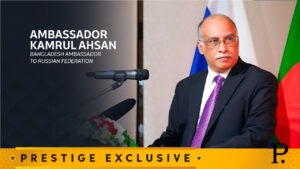Q. We would like to start with your academic background and childhood
Recalling my childhood, it was a very disciplined life for me. My Father was a Government Official, and I was the second child of my parents. After completing my primary schooling, I joined Sylhet Cadet College, where I completed my SSC and HSC and joined Bangladesh Navy in January 1985. Though getting selected for both Army and Navy, I chose the Navy as it is the most Royal and decorated service. Furthermore, it opened the doorway to travel to various corners of the world, which also comes with diverse challenges.
I joined the Naval Academy in 1985 as an officer cadet in the Executive Branch. After spending one year of my training, I received a scholarship to undergo training in the Royal Malaysian Navy for three years. It was an honor for me since I was the first officer cadet trained in Royal Malaysian Navy. I completed the training with outstanding performance as international student. After returning, I attended training in different level and started serving onboard ships of different types. Later I did specialization training in Gunnery from abroad where I topped and became a Naval Gunnery Specialist. I completed my staff course from Defence Services Command and Staff College in Mirpur and later attended second staff course in French War College.
As an Executive Branch officer, I commanded six warships ranging from patrol craft to frigate including the flagship. As Captain, I had the privilege to command one of the most modern frigates BNS BANGABANDHU, the flagship of Bangladesh Navy where I received the National Standard from Honourable Prime Minister. After the frigate command, I was sent to undergo Royal College of Defence Studies (RCDS) course in UK and earned Master’s Degree in International Relations from King’s College, London.
On return from UK, I got promoted to the rank of Commodore and became the Director of Naval Plans at the Naval Headquarters. I used to plan for the Navy as a whole where I had to work relentlessly regarding its expansion and force acquisition. I then went to command BNS ISSA KHAN, the largest naval base. After commanding the base for nearly two years, I served as a Director of Blue Economy under the Ministry of Energy. Later on, I became the Area Commander of Dhaka Naval Area. In September 2019, I got promoted to Rear Admiral and became the Area Commander of Khulna Naval Area. After completing my tenure there, I became the Chairman of the Mongla Port Authority on 24th January 2021.

Q. What memorable experiences would you like to recall from your early training days?
In my long naval career, there were many instances to be remembered as challenging and adventurous. Facing the 1991 cyclone is one of the most remarkable as well as breathtaking experience that I still recall. As a Weapon Officer of a Guided Missile Frigate, I had the opportunity to launch a missile. As a young Lieutenant, it was a challenging and thrilling task
Commanding naval ships and operating in rough sea conditions were the hardest tasks. As the Director of Plans for Navy, the tenure was memorable and challenging phase of my life where I was responsible for planning on the expansion and development of the Navy in line with the long-term visions of Government. Implementing the ideas through plans is a significant task, and I am honored that I was able to serve the Navy on such a scale.
The memorable incident in my career that I consider was the event of receiving the National Standard from the Honorable Prime Minister, as the Commanding Officer of the Flagship BNS BANGABANDHU in August 2013. This was a great honour for me and my Navy.


Q. Tell us about your assignment as a Chairman of Mongla Port Authority and how you have prepared yourself for this role?
As you may know, Port is a significantly complex industry that includes several aspects such as port operation, managing export/import, working with various agencies, etc. I took it as a challenge and decided to lead with my unwavering determination and courage to change the dynamics of the Mongla Port since my first day here. Gradually, I realized how significantly I could contribute to the economy by streamlining the system and making the Port vibrant and dynamic through the experience and leadership skills. I have received enormous support from the Ministry, employees, and stakeholders to make my vision to a reality. Collaborating with the stakeholders allowed me to get a detailed insight into the dynamics of the Port and how the shipping business and management functions can change the shape and future of the Port.
Coming from a Navy background, I was on a relatively different journey with numerous challenges. I am glad that I have lived up to the expectations and actively integrated all the systems available. When you manage a thing of such a scale, you must ensure you are working with others by integrating all the available resources to align with your vision. Starting from development partners, shipping agencies, importers & exporters, facilitators, local and international organizations, you must keep everyone on the same page to succeed. Utilizing limited resources and efficient use of limited budget for the development works are also challenging and daunting tasks.
Furthermore, managing the Port during Covid-19 was also an extreme challenge. Russia – Ukraine conflict is also causing some issues since we have many Russian ships coming to our Port with the materials for our mega projects regularly. But I feel proud that under my leadership, the port operations faced no interruption in the last two years despite all those obstacles like pandemic or conflict.
Ensuring this efficiency and functionality of every component involved, using resources efficiently, and managing the stakeholders are testing job at times. In the meantime, it is crucial to look after all the projects and complete them within the given timeframe. Till now, we completed several projects such as Vessel Traffic Management Information System, procurement of cargo handling equipments, etc. In addition to that, we have several important projects currently ongoing. Recently, MPA signed few contracts for the expansion and upgradation to enhance the capacity of Mongla Port.

Q. As you mentioned, you joined Mongla Port amidst Covid; it was a critical time globally. How did you address the issue and resolve it?
Immediately before this role, I was the Area Commander of Khulna Naval Area, and during that time, I took several precautions and measures for my men deployed in various areas under my command. I ensured health safety and maintained according to the health protocols prescribed by the Government to prevent from any sickness or casualties. On taking over the charge as Chairman of Mongla Port, my first task was to implement the necessary health protocols directed by the government and other healthcare organizations to ensure maximum safety as we have commodities coming every day for import and export. So, safety was our priority during those difficult times. We made sure every personnel were vaccinated and provided treatment when necessary. We conducted health screenings for the locals and the crew coming with the foreign ships to maintain the health protocols. Combining all these aspects and our uncompromised efforts, we were able to provide smooth and flawless port operations during those difficult times without any suspension of port operation for a single day.


Q. What future do you envision for the Mongla Port as a shipping and connectivity hub for the rest of the region, locally and globally?
Firstly, the Government has approved several projects for Mongla Port. We have already completed a few of them, and the rest are ongoing. The implementation of these projects will enable us to increase our capacity two to three times more within four years. We are also optimizing connectivity efficiency and planning to introduce multimodal transportation in coordination with the Government agencies. As the Padma Bridge has already been connected and once the rail connectivity will be established by this year hopefully, it will make the entire communication system rapid and trade friendly. It will facilitate the transportation to any part of the country.
Considering regional connectivity, Mongla Port is the key hub that will make the entire process effective. With rapid industrialization in the south western sector, the dependency on the Mongla Port is increasing. We had some trial runs with India as they sent containers to our Port, and later the containers were transported to the North- Eastern states of India last year, which has been a successful process. Besides, the delegates from Nepal and Bhutan also visited our Port and expressed the interest in using Mongla Port, which indicates that developing Mongla Port will be the pivotal step towards regional connectivity.

Q. How do you measure the impact of the efficiency of the Mongla Port due to the establishment of the Padma Bridge?
The contribution of Padma Bridge in exporting goods through Mongla Port is significant. Since its inauguration, we have been exporting garments goods from Dhaka and dispatched to Europe without any delay.
We have already exported numerous containers, and the capacity will triple after the implementation of our expansion/upgradation plans in terms of the ship, cargo, and container handling. We have already set a new record for the highest number of vehicles imported by importing 21,157 vehicles through the Mongla Port last year. We have similar goals with cargo and container if we can implement the expansion plans within the timeline.
We have recently imported over 6,54,811 metric tons of goods and machinery through our Port for several national Mega Projects, including Metro Rail, Sk. Mujib Railway Bridge, Ruppur Nuclear Power Plant, Rampal Thermal Power Plant and grids, etc. However, the extraordinary fact is, within a short period, Padma Bridge has contributed significantly to import more than 51,703 metric tons of cargo for megaprojects, which is a clear reflection of its impact.

Q. How is Mongla Port contributing to the Nation’s economy and living up to the vision?
Two decades ago, Mongla Port was less active than it is now. Coming from that, it has now become one of the highest revenue-generating Ports in our country. This Port generated earnings of over 340 crore BDT in 2020-21. Between 2021-22, the amount was 316 crore BDT. The Port, Customs EPZ and other industries in Mongla earn over 5,000-6,000 crore BDT as revenue annually, and the figure is gradually increasing. This reflects how the Mongla Port is contributing to our national economy in a significant manner.

Q. Since Bangladesh is going through a digital transformation, how is Mongla Port keeping up with this trend?
Automation and digital transformation of Mongla Port have already started since 2019. With this transformation, the vessels coming in are being tracked, guided and assisted for their convenience starting from the entry point at the fairway buoy at Bay of Bengal. All our stakeholders get a one-stop solution as we track and keep records through our automated systems to provide state-of-the-art facilities. It also helps me to keep track of the Port’s activities and surroundings. Thereby these integrated systems allow us to make the process seamless. These technologies also benefit the people working here, along with the stakeholders. With the help of electronic data tracking and files, the day-long wait is minimized to minutes. This automation has significantly increased our efficiency, and we plan to incorporate more advanced additions in the near future to strengthen security and efficiency.

Q. What are the distinguishing factors of Mongla Port?
As Mongla Port is situated 130 km inside Sundarbans, one of the important world heritage site, we need to maintain national and international regulations to protect the environment. So, compliance is an integral part of our operation. We have already started setting up Modern Waste and Oil Spill Control Management Systems which will allow us to recover waste or oil spill dropped by any vessel and keep the channel clean and navigable. We must keep the environment as priority and ensure that the biodiversity of Sundarbans and Pashur channel are taken care of, which are not considered in other ports. We are working to transform the Mongla Port into a smart port. The industries that cause pollution are already restricted in this area. We also closely monitor all the vessels and take measures to ensure no harmful pollution takes place which may affect the environment.

Q. What role does Mongla Port Play in the betterment of the people working in this facility?
We collaborate with national organizations like the health department, security and law enforcement agencies to facilitate them. We focus on their overall well-being and improving their lifestyle with our consolidated efforts. We have our hospital and further planning to establish residential complexes to provide our people with the best facilities possible. We always emphasize on the living condition and providing basic health and medicare support to our employees and workers. Coming to compliance, we handle the containers according to international security codes. The representatives of international authorities often visit and inspect, give us feedback. We incorporate them into the system of our operation. Our security team carefully inspects and ensures that compliance is maintained all the time. These are the common standards of this Port, which the MPA maintains and ensures in a strict manner.


Q. Our majority of the exports are happening in the seaport sector. The Port has contributed a lot to the economy as well. So, what will be your take on the whole sector, not only the Mongla port authority but for the betterment of the seaport, and where should we target to become a Global figure in the port authority?
The foremost thing is that the Port Authority should strive to achieve the standard of how we handle the ships here. The most important part is to maintain the navigability of the channel.
Once we can complete the capital dredging of the channel, in order to ensure the navigability of 9.5 meter draft vessels, we need to carry out the maintenance dredging regularly. Navigation marking and the VTMIS have to be kept operational as well as handling equipment for the cargo and container like any other international ports.
MPA has procured 75 new pieces of equipment for handling cargo and containers recently. MPA has a good number of high-quality equipment to handle the container and cargo. As long as we can reduce the waiting time, the more ships will come here, and compliance of safety will make the Port more attractive to our shipping agents, exporters and importers.
Housing of all the containers is another important aspect. For that, we are building more jetties and yards in our expansion plan. It is also required that other agencies like Customs need to keep the pace with MPA to make the port function smooth as all these agencies are working for the same purpose. As a result, they also need to enhance their capability and modernize their customs collection and customer handling system. So, Port is a sector where many stakeholders function to meet the requirement of increasing trade in a coordinated manner to draw the maximum benefits to the economy.

Q. You had a very dynamic professional life; what’s your take on the new officers or the new generation that you talk or speak with in your teaching in universities? How do you see them?
I’ve spent 38 years in the Navy. So, having served in many appointments in the fleet, staff appointments in the Headquarters and International organizations and then working here as the Chairman and the CEO, I would recommend the young officers to come forward and to be more updated on the current operation of the Port such as how the global seaborne commerce is going on and keeping pace with the Port administration and shipping management etc been followed globally.
Whenever we want to recruit new people here, we want to know about their background in IT, international shipping knowledge, knowledge on rule of law, etc. I would say that a young officer or an employee should be ready to take more academic programs on shipping management before stepping over here which will create a big difference between one who comes in and learns and then does a job and one who comes prepared and does the function efficiently.
In our present global context, there are demands for more educated, agile, and skilled personnel as we are not only dealing with local people but also with international people and systems. The main function of any sea port is to deliver and facilitate good services to shipping, export/import, navigability and piloting in the sea/channel efficiently and safely. Thus the port will generate more revenue for the country and the economy which will make the Port more effective, dynamic, and functional.

Q. Speaking of this new generation, mental health is a considerable concern that we’re all talking about around the world, and you do a highly intense job. Your decision directly contributes to the economy of the entire country. How do you manage that, and what advice would you give younger people to do it properly?
For young individuals, I would suggest them to be active listeners and doers, understand the system, and learn the techniques and tactics. Regardless of my 36 years career in the Navy, I needed to acquire the knowledge regarding port operation. I have gone to the global stage and gained extensive knowledge about shipping management, cargo handling, and vessel functionality etc.
In our Port, we have 12 different departments with different functions. So, through the management structures, I get a holistic picture into the overall functionality.
As a leader, it is essential for me to swiftly get accustomed to the functions, know my responsibilities, and figure out how I am going to be more accessible to the people who are under my command or management as well as the stakeholders working in this sector.
In this role, I’m not only responsible for maintaining my employees but also integrating the people of different professions who come and work in the Port such as handling projects, shipping businesses, handling equipment, finance management, providing security, etc.
Furthermore, MPA also have many individuals working on several projects like dredging operation, equipment supply and upgrading projects etc. MPA also has engineers, environment experts and journalists coming in where we consider their opinions for our future goal and prospects. We also closely work on our policy options and the directives/guidelines of the Ministry to implement the projects and run the administration.
We also take lessons from other ports at home and abroad, those who face more complex situation and connectivity through rail, road and waterways etc. So, one need to work and study extensively before moving into execution.

Q. In your opinion, what’s the mantra for stress management for the younger generation?
Individuals who are just starting their journey into Port operation and management need to have an eye for learning and patience to succeed. They should not take it as just a job and a source of wealth; they need to develop the individual skills in respective fields. Those who aspire to come to port should solidify their technical knowledge, as it is an essential tool to modernize our systems and move them towards excellence.
Currently, we are also strengthening the shipping and port handling operations. We need to optimize the capacity of the Port while taking different stakeholders on board. So, there is a point of integration, and the management policy has to reflect on doing more integration. This will reduce the cost of operation and multiply our returns.

Q. You’ve already created a high benchmark for yourself, but what’s the next step? Where do you see yourself, and what’s the plan?
That surely depends on where the Country and the Government needs my service. The Government has assigned me here for a duration, and if the Government considers that I’m required somewhere else in the military or national sector, I shall depend entirely on the decision of the Government with complete devotion and loyalty. However, as long as I am here, I will work on developing the Port and keeping it functional, dynamic, and smart.






